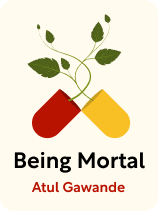

This article is an excerpt from the Shortform book guide to "Being Mortal" by Atul Gawande. Shortform has the world's best summaries and analyses of books you should be reading.
Like this article? Sign up for a free trial here.
What is the problem with the modern approach to end-of-life care? What are some ways we can help ease the passing of the dying?
According to Atul Gawande, the author of Being Mortal: Medicine and What Matters in the End, our modern approach to aging and dying harms our well-being. He suggests some specific ways we can help the dying meet their ends with peace, dignity, and composure.
In this article, we’ll examine the key takeaways from Gawande’s Being Mortal.
1. We Need to Reorient End-of-Life Care Priorities
According to Being Mortal: Medicine and What Matters in the End, one way we can improve our experience of aging and dying is by reorienting our end-of-life care toward present-oriented priorities.
Referring to the work of psychologist Laura Carstensen, Gawande observes that our priorities change depending on how much time we believe we have left to live. People close to death have a present-oriented outlook: They value close relationships, treasured memories, and simple pleasures. However, the people caring for them tend to have a future-oriented outlook. They value ambitious life goals, personal independence, meeting new people, and having new experiences—and they often assume their patients share their outlook.
Our modern approach to dying is dominated by this future-oriented perspective and so neglects the core values of the dying, argues Gawande. A feeling of togetherness, for instance, is central to a present-oriented perspective: The dying are rarely interested in making new friends and acquaintances because they want to feel connected with their deepest, oldest relationships. Hospitals and nursing homes, however, are characterized by a feeling of isolation among strangers and new acquaintances.
Likewise, doctors who overlook the simple daily needs of their elderly patients fail to recognize that, for the dying, living well in the present is more important than hoping for a better future. Often, Gawande finds that doctors work to extend the lives of their patients, inadvertently depriving those lives of meaning and purpose in the present.
2. We Need to Talk About Aging and Dying
According to Gawande, another way we can improve our experience of our mortality is by talking about aging and dying more openly. We tend to avoid these conversations, but that leaves us ill-prepared to deal with the challenges aging and dying present.
These challenges elicit powerful emotions we must acknowledge to reduce some of the fear and uncertainty that surrounds death. For instance, the dying often fear the process of decline—the pain, memory loss, or the suffering their loved ones endure. These fears are often mixed with powerful hopes, as well—hope for a cure, for comfort, for the ability to stay lucid.
According to Gawande, such concerns should be acknowledged and discussed openly to navigate the final days of life. These are difficult conversations, and many doctors mishandle them. For instance, some dominate the conversation, focusing on how to fix the problem and plan a course of treatment. Others are more reserved, preferring to let the patient or family make all the decisions with little or no guidance.
However, a few well-practiced physicians use an approach Gawande believes is best: the interpretive approach. With this approach, doctors help patients speak about their fears and hopes and figure out exactly what they want for their end-of-life care. They give them information about their prognosis, treatment options, and potential risks and rewards, but they also help them understand the implications of that information as it relates to the patient’s deepest concerns.
Often, by determining what a patient hopes to be able to do, whether it’s making it to a child’s wedding or simply enjoying food, doctors can advise patients about the best strategy to help them achieve their goals. Similarly, by understanding what a patient fears most—the indignity of being unable to control bodily functions, for instance—doctors can help steer patients toward the best options. In this way, by working with the patient, doctors can tailor an approach to their end-of-life care.
Family members can model their own conversations about death on this approach. The most important components are acknowledging death, being clear about hopes and fears, and deciding what to prioritize as time runs short, writes Gawande.
3. We Need to Help the Dying Retain Their Autonomy
A third way we can improve our approach to mortality has to do with autonomy. Gawande believes that helping the dying preserve their autonomy is one of the most important aspects of end-of-life care. He distinguishes between negative and positive autonomy.
Negative autonomy is the absence of constraints. This is the autonomy we look for when we simply want our body to be fully functional and healthy. To Gawande, this autonomy is no longer critical for the aging and terminally ill—on the contrary, as our bodies weaken, it’s vital to acknowledge our limitations and dependence.
Positive autonomy, by contrast, is the freedom to direct your life. According to Gawande, this freedom is crucial for those facing death, as it allows them to live according to their values and retain meaning in spite of severe limitations.
One way to help the dying retain this kind of autonomy is to establish it as the priority in end-of-life care. Gawande argues that by keeping this in mind, you’re better able to judge which actions to take. Caretakers should work with the dying to help them maintain their ability to direct their lives toward the things that give them purpose and meaning.
This can manifest in different ways. Some elderly people may choose to care for a pet, for instance. Others may simply enjoy listening to music or being outside. Elderly individuals will choose to spend their time in different ways if they can make that choice.
In the case of the terminally ill, facilitating their autonomy may involve letting them choose to forgo treatments that could extend their lives but that may cause pain or isolation. Or it may involve ensuring they have medication to manage pain. The goal is to support their ability to choose the way they spend their final days.
4. We Need to Be Judicious in Our End-of-Life Healthcare
According to Gawande, a final way we can improve our approach to dying is to be judicious in our end-of-life healthcare. This involves being decisive about what we want and resisting the urge to address every ailment the dying face.
Gawande insists we should decide exactly what we want for our last days. Do we want to undergo every possible life-saving treatment? Or are we willing to forego treatment so we can stay clearheaded and have more time with our loved ones? Should doctors try to resuscitate us? Or will we let our bodies naturally give out? We must consider these difficult questions if we hope to give ourselves and our loved ones peace and closure in our final moments.
If we don’t decide how we want to live our final days, we’ll likely get caught up in the inertia of our modern, medicalized approach to dying, which will undermine our ability to find peace. The dying are often barraged with endless treatments and relegated to the isolation of a hospital ward, unable to experience closure as they should. Gawande argues that the dying should have the chance to wrap up their affairs, share their deepest thoughts, encourage their loved ones, and establish their legacies. Being deprived of these opportunities is devastating for those facing death, but medical institutions often do just that.

———End of Preview———
Like what you just read? Read the rest of the world's best book summary and analysis of Atul Gawande's "Being Mortal" at Shortform.
Here's what you'll find in our full Being Mortal summary:
- What it's like to age and die in the 21st century
- Why we need to be better at accepting death
- How to improve the well-being of the aging and dying






